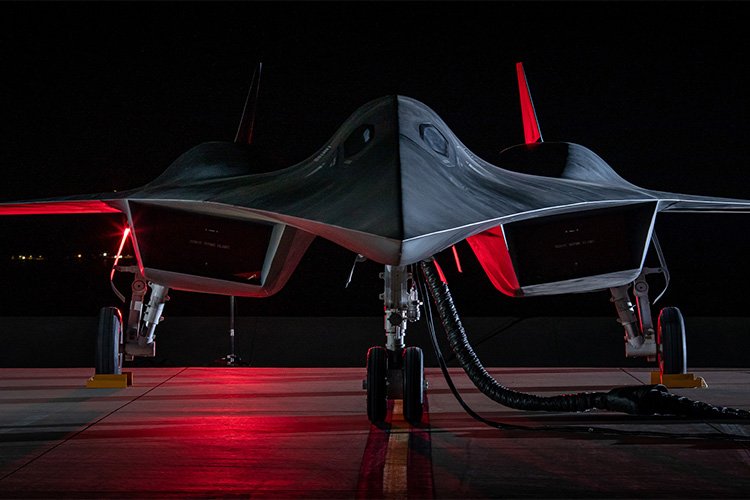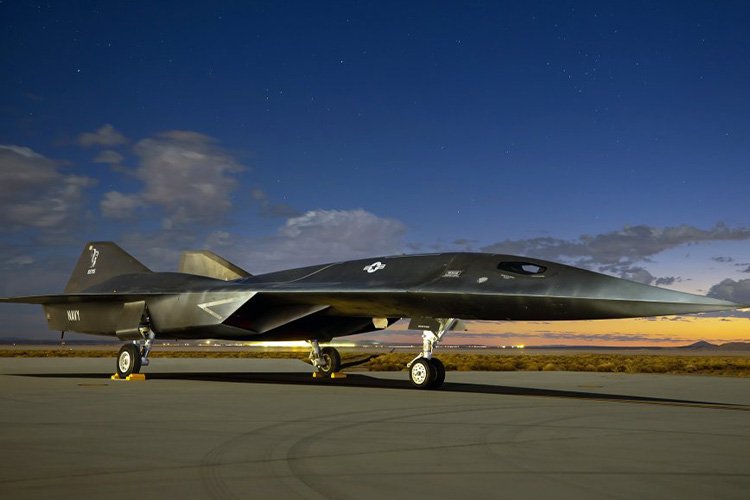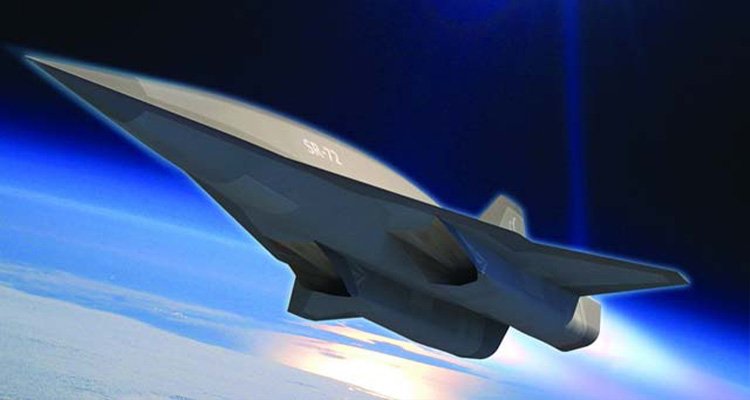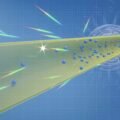In a series of tweets, the American aerospace and defense corporation Lockheed Martin congratulated the film Top Gun: Maverick on its six Oscar nominations and winning the award for Best Sound.
Lockheed’s legendary advanced development division, Skunk Works, had worked with producers to create the fictional “Darkstar” hypersonic aircraft flown by the film’s star Pete “Maverick” Mitchell.
Interestingly, among the congratulatory messages, Lockheed appeared to hint that perhaps the existence of an aircraft resembling the “Darkstar” wasn’t merely fantasy.
Furthering intrigue, when asked by The Debrief, Lockheed officials left the possibility open that the company may indeed already have a mysterious Darkstar-esque high-altitude, hypersonic surveillance aircraft lurking in the shadows.


In a tweet posted on March 12, Lockheed shared an image of the Darkstar aircraft, ominously bathed in red light, with the message, “To celebrate, we are sharing some Maverick-worthy images of real aircraft. #RealTopGun [emphasis added].”
Lockheed has previously acknowledged that its Skunk Works designers had taken the job of designing the film’s Darkstar seriously, confirming that a full-scale mock-up of the proposed Mach-10 capable jet was built.
The mock-up was so convincing that Top Gun producer and filmmaker Jerry Bruckheimer said China had re-oriented a spy satellite to photograph the aircraft during filming.
“The Navy told us that a Chinese satellite turned and headed on a different route to photograph that plane,” Bruckheimer told Sandboxx News in 2022. “They thought it was real. That’s how real it looks.”
Yet, in their recent tweet, Lockheed Martin suggested that perhaps the Darkstar was a “real aircraft.”
Hours later, Lockheed shared another photo, offering a portside view of its famed SR-71 Blackbird high-altitude strategic reconnaissance aircraft. With the image, Lockheed added the caption, “The SR-71 Blackbird is still the fastest acknowledged crewed air-breathing jet aircraft [emphasis added].”
Developed in the 1960s by Lockheed Skunk Works and renowned aerospace engineer Clarence “Kelly” Johnson, the SR-71 was the U.S.’s premier high-altitude surveillance and reconnaissance aircraft until its retirement in the late 1990s. Capable of flying at Mach 3.2 (2455 mph), the SR-71 still holds the world record for the fastest air-breathing manned aircraft.
Lockheed’s purposeful mention of the SR-71 as the world’s fastest “acknowledged” aircraft seemingly suggests that a faster, “unacknowledged” aircraft may exist.


Ultimately, Lockheed may just be trolling its competitors–America’s near-peer adversaries–and the general public with its not-so-subtle hints. However, this isn’t the first time the company has suggested that at least some aspects of the Darkstar aircraft aren’t fiction.
Last year, Lockheed Martin CEO, James Taiclet, described the company’s involvement in developing the Darkstar for Top Gun: Maverick.
“When the Top Gun: Maverick team was looking to push the envelope and stand true to Maverick’s Need for Speed, Skunk Works was their first call,” Taiclet wrote on LinkedIn.
“With Skunk Works’ expertise in developing the fastest known aircraft combined with a passion and energy for defining the future of aerospace, Darkstar’s capabilities could be more than mere fiction. They could be reality…[emphasis added].”
Lockheed later shared the CEO’s comments in a press release, including the ellipsis after “They could be a reality,” indicating something had been intentionally left out.


When the Air Force retired the SR-71 Blackbird in 1998, this left the U.S. without a high-speed, long-range, high-altitude, crewed aircraft for intelligence, surveillance, and reconnaissance (ISR) missions. In its place, the Pentagon has relied on its arsenal of spy satellites, unmanned aerial vehicles (UAV), and fifth-generation stealth aircraft to fill the potential coverage gap left by the SR-71’s departure.
However, the growth of anti-satellite weapons, anti-access/area-denial, and counter-stealth technologies caused defense planners to consider the potential for hypersonic aircraft capable of traveling at extremely high-speeds to penetrate protected airspace or evade air defenses.
To meet this need, Lockheed Martin’s Skunk Works reportedly began developing a hypersonic UAV sometime around 2007.
In 2013, the company finally revealed that it was indeed developing a twin scramjet engine aircraft, designed for a cruise speed of Mach 6 or 4604 mph, dubbed the SR-72, colloquially referred to as the “Son of Blackbird.”
The development of the SR-72 has been shrouded in secrecy. However, as of 2018, Lockheed Martin said an SR-72 prototype was scheduled to fly by 2025, and the aircraft could enter service by the 2030s.
Unlike its predecessor, the hypersonic SR-72 is supposedly an unmanned aircraft capable of carrying out offensive missions in addition to surveillance and reconnaissance operations. Reportedly, the “Son of Blackbird” is designed to be the first hypersonic aircraft in the world capable of launching hypersonic missiles.


Defense and aviation observers have noted that Darkstar aircraft appearing in Top Gun: Maverick resembles Lockheed concept art for the proposed SR-72 aircraft. Before the film’s release in May 2022, Lockheed’s Director of International Communications, John Neilson, said there were rumors that the movie would offer a “sneaky peak at what might be the Lockheed Martin SR-72.”
At least some aspects of the Darkstar have origins in technology currently being developed by Lockheed Skunk Works.
Most notably, the Darkstar’s cockpit has no forward visibility. Instead, the film’s star, “Maverick,” must rely on a synthetic monitoring system to see what’s in front of the aircraft. This same type of system is featured in Lockheed Martin’s experimental supersonic plane, the X-59 QueSST, which is slotted for flight testing in 2023 as part of NASA’s Low-Boom Flight Demonstrator project.
The X-59’s long and pointed nose-cone obstructs all forward vision. A pilot uses an enhanced flight vision system and 4k camera to see what is in front of the aircraft.
The name “Darkstar” also comes from an actual drone, the RQ-3″ developed by Lockheed and Boeing in the mid-1990s. The RQ-3 was initially built to be a high-altitude, stealth, reconnaissance, and surveillance UAV. However, the project was canceled in 1999.
Aspects of the RQ-3 Darkstar were eventually incorporated into the secretive RQ-170 Sentinel, currently in use with the U.S. Air Force and CIA.
Given the comments about the fictional Darkstar, one can’t help wondering if the SR-72 program is actually more mature than has been previously let on.
When reached for comment, officials at Lockheed Martin did not dismiss the idea that the company might already have a hypersonic aircraft capable of soaring at over six times the speed of sound.
“I can confirm that we designed Darkstar for the film,” a Lockheed spokesperson told The Debrief.
As for whether the Darkstar or something similar really exists, the company’s spokesperson said, “I don’t have anything additional to share related to the language used in the tweet.”
Tim McMillan is a retired law enforcement executive, investigative reporter and co-founder of The Debrief. His writing typically focuses on defense, national security, the Intelligence Community and topics related to psychology. You can follow Tim on Twitter: @LtTimMcMillan. Tim can be reached by email: tim@thedebrief.org or through encrypted email: LtTimMcMillan@protonmail.com
